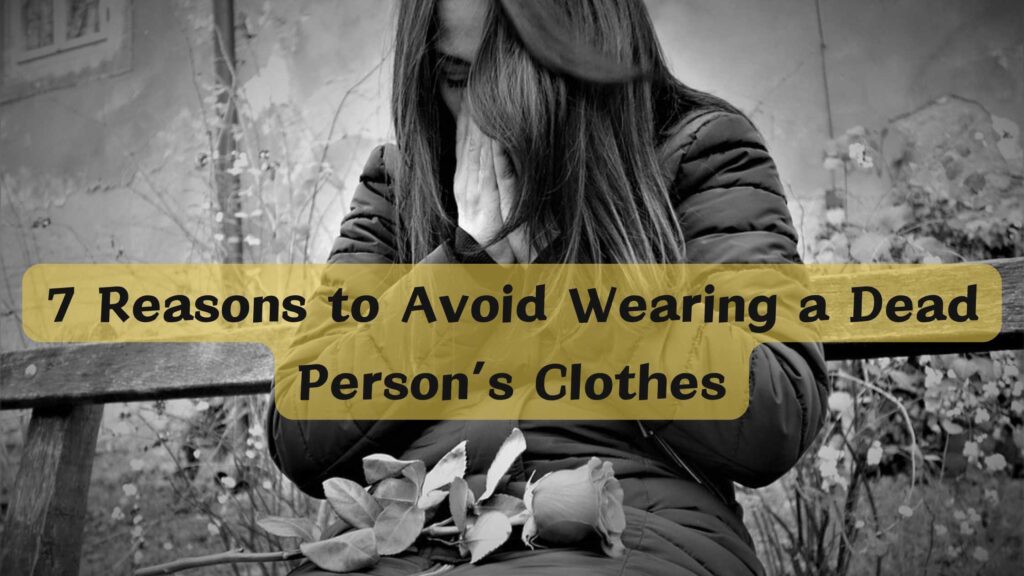When someone close to us dies, their clothes can carry a lot of emotional and cultural meaning. Different religions and traditions have unique ways of dealing with the clothes of the deceased, shaped by beliefs about the spirit, energy, and honoring the person who passed. This is why people often avoid wearing the clothes of someone who has died.
Read this also: Understanding Death with Open Eyes
Why You Should Not Wear Dead Person’s Clothes
1. Cultural Beliefs and Negative Energy
In Hinduism, it’s believed that the clothes of someone who has passed carry their energy and unresolved karma. Wearing them might bring bad energy, so many choose to burn or bury the clothes to help release the soul’s ties.
In Islam, wearing the clothes of the deceased is seen as a bad sign. To avoid sorrow, these clothes are often donated to charity, honouring the person by helping others.
In Christianity, there are no strict rules about keeping or wearing a deceased person’s clothes. However, many people donate them to those in need as a sign of respect and kindness, believing the spirit moves on to a better place.
2. Emotional and Spiritual Reasons
In many cultures, it’s believed that the clothes of someone who has passed hold their spirit. Wearing these clothes is thought to bring bad luck or sadness.
3. Disposing of the Clothes
Different traditions treat clothes of the deceased in unique ways:
- Donation: In Christianity and Islam, giving clothes to those in need is a way to honor the person who passed away.
- Burning or Burying: In Hinduism, burning or burying clothes helps release the soul and prevent bad energy.
- Preservation: Some people keep clothes as mementos, though this practice is rare in Islam and Hinduism.
4. Personal Comfort and Beliefs
Cultural and religious traditions matter, but how people feel is just as important. Some find peace in holding on to or wearing these clothes, while others feel uncomfortable and choose to move on from them
5. Psychological Impact
Wearing clothes of a loved one can bring up strong memories, making it hard for some people to handle emotionally.
6. Respect for the Departed
Donating or giving away clothes with care can be a respectful way to remember someone who has passed, while also honoring cultural traditions.
7. Avoiding Misfortune
Some traditions believe that wearing clothes from someone who has passed away brings bad luck, so people often steer clear of doing it.
Conclusion
What happens to a deceased person’s clothes is influenced by culture, religion, and personal values. Whether they are donated, thrown away, or kept, it’s important to make a choice that honors the memory of the person and brings comfort to those still here.
Why do some cultures avoid wearing the clothes of a deceased person?
Different cultures and religions believe that the clothes of the deceased carry their energy or spirit. Wearing these clothes is thought to bring bad luck, negative energy, or sadness.
What does Hinduism say about wearing the clothes of the deceased?
In Hinduism, it is believed that wearing the clothes of a deceased person might bring bad energy or unresolved karma. Many choose to burn or bury the clothes to help release the soul’s ties.
How does Islam view wearing deceased people’s clothes?
In Islam, wearing the clothes of the deceased is generally seen as a bad omen. These clothes are often donated to charity, which is seen as a respectful way of honoring the deceased and helping others.
What is the Christian perspective on wearing deceased people’s clothes?
Christianity does not have strict rules about wearing the clothes of the deceased. However, many Christians donate the clothes to those in need, seeing it as a sign of respect and kindness.
What emotional or spiritual reasons make people avoid wearing the clothes of the deceased?
Many cultures believe the clothes of the deceased hold the spirit of the person who passed. Wearing these clothes is thought to bring bad luck or sadness, which can be emotionally unsettling for some.
How can donating or giving away deceased person’s clothes be respectful?
Donating clothes or giving them away with care can be a way to honor the deceased, show respect, and help others in need, aligning with cultural traditions and personal values.
Why do some people believe wearing deceased person’s clothes brings misfortune?
Many traditions believe that wearing clothes of someone who has passed away brings bad luck or misfortune, so they avoid doing so in order to protect themselves from negative energy.








